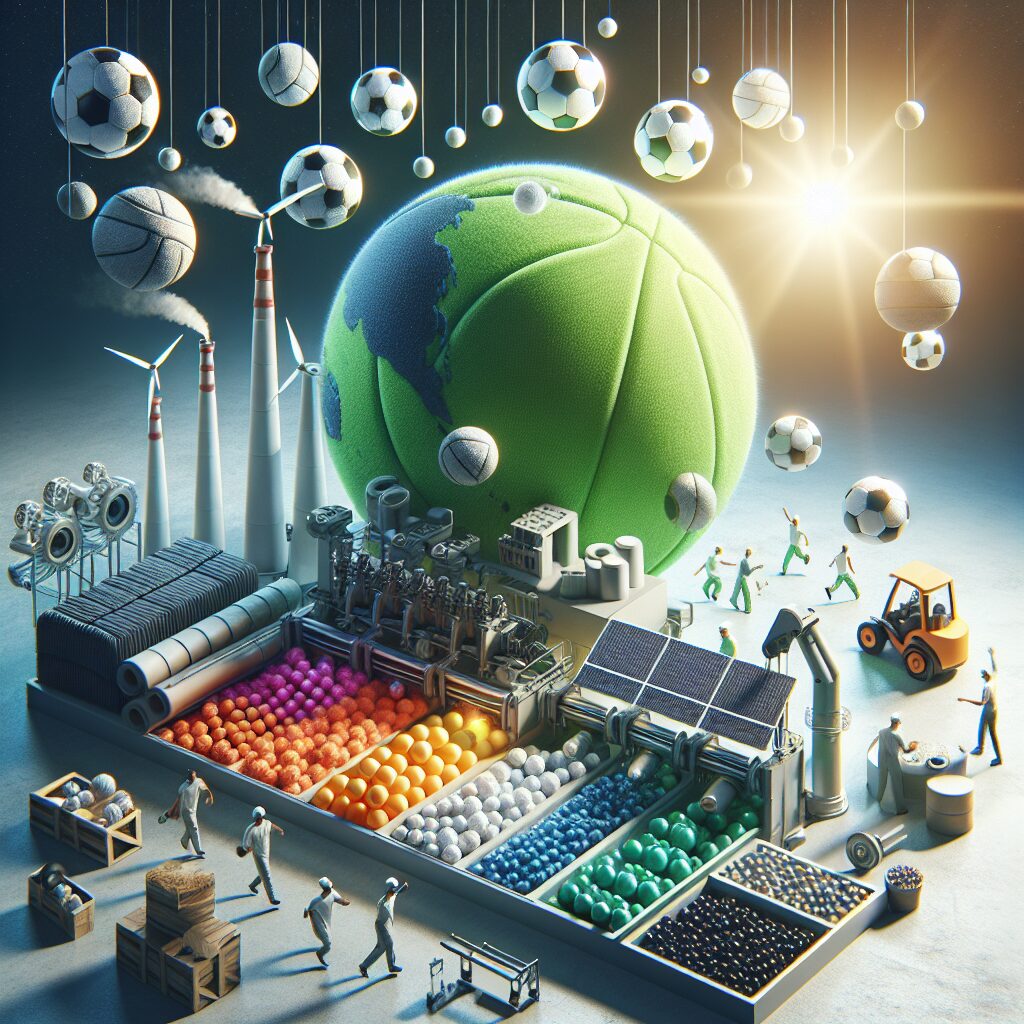Ethical production has become a crucial aspect in today’s consumer-driven society, where there is an increasing demand for sustainable and eco-friendly products. One particular area that deserves attention is the production of balls used in various sports and recreational activities. From soccer balls to basketballs, the eco-friendliness of these balls ensures that not only are they constructed using sustainable materials, but they also have a minimal negative impact on the environment.
When it comes to the production of balls, ensuring the eco-friendliness goes beyond the use of environmentally friendly materials. The manufacturing process itself plays a significant role in determining the ecological impact of these products. From the energy consumption in the factories to the waste generated during production, every step needs to be carefully considered. Additionally, the ethical treatment of workers involved in the production is equally important, ensuring fair wages and safe working conditions.
In the upcoming sections, we will delve deeper into the key takeaways of ethical production in the ball manufacturing industry. We will discuss the use of sustainable materials and technologies, the importance of certifications and standards, as well as the impact on communities and the environment. By understanding the significance of ethical production in the context of balls, we can make informed decisions as consumers and contribute to a more sustainable future.
Key Takeaways
1. Manufacturers of sports balls must prioritize ethical production practices to ensure eco-friendliness. This involves considering the environmental impact at all stages of production, from sourcing sustainable materials to implementing energy-efficient manufacturing processes.
2. The primary material used in sports balls, such as rubber or synthetic leather, should be sourced responsibly. Using rubber from sustainable plantations or opting for synthetic leather made from recycled materials helps minimize the environmental footprint of ball production.
3. Ethical production also encompasses fair labor practices, ensuring workers receive fair wages, safe working conditions, and fair treatment throughout the entire supply chain. Companies should prioritize partnerships with suppliers that adhere to ethical labor standards.
4. Recycling and reducing waste play a crucial role in the eco-friendliness of ball production. Manufacturers should explore options for using recycled materials or finding innovative ways to repurpose leftover materials.
5. Collaboration across the industry is essential for driving change towards ethical and eco-friendly ball production. By sharing best practices, implementing industry-wide sustainability standards, and supporting initiatives that promote sustainable production, the sports industry can collectively work towards a more eco-conscious future.
How Can Ethical Production Ensure the Eco-Friendliness of Balls?
The Importance of Ethical Production
Ethical production plays a crucial role in promoting sustainability and reducing the environmental impact of various industries. When it comes to ball manufacturing, ethical production practices are necessary to ensure that the production process and materials used align with eco-friendly standards. Ethical production not only benefits the environment but also contributes to the overall well-being of communities and workers involved in the supply chain.
Choosing Sustainable Materials
One of the key aspects of ensuring the eco-friendliness of balls is selecting sustainable materials. Whether it’s a soccer ball, basketball, or any other type of ball, opting for materials that are renewable, recyclable, or biodegradable is essential. For example, using natural rubber instead of synthetic materials significantly reduces the environmental footprint. Additionally, considering recycled or organic fabrics for the outer covering can further enhance the sustainability of the ball production process.
Reducing Waste and Energy Consumption
Ethical production entails minimizing waste generation and energy consumption throughout the ball manufacturing process. Implementing efficient production techniques, such as lean manufacturing principles, can help eliminate unnecessary steps and reduce material waste. Moreover, utilizing renewable energy sources like solar or wind power for production facilities can greatly reduce carbon emissions. By focusing on waste reduction and energy efficiency, ethical production practices contribute to a more sustainable ball manufacturing industry.
Ensuring Fair Trade and Labor Standards
Ethical production also emphasizes fair trade and labor standards in the ball manufacturing industry. It is essential to ensure that workers involved in the production process are treated fairly, paid a living wage, and provided with safe working conditions. Implementing fair trade certification programs can help guarantee transparency and accountability throughout the supply chain. By prioritizing fair trade and labor standards, ethical production contributes to social welfare and supports responsible business practices.
Collaboration and Transparency
To achieve eco-friendliness in ball production, collaboration and transparency among stakeholders are paramount. Ball manufacturers, suppliers, and consumers need to work together to promote sustainability and environmentally-friendly practices. Transparent communication regarding the sourcing of materials, production methods, and environmental certifications can foster trust among consumers. Collaborative efforts can also facilitate knowledge sharing, innovation, and the development of best practices, further promoting the eco-friendliness of balls.
Guidelines for Ethical and Eco-Friendly Ball Production
- Choose sustainable materials such as natural rubber and recycled fabrics.
- Reduce waste generation and energy consumption through efficient manufacturing techniques.
- Ensure fair trade and labor standards throughout the supply chain.
- Promote collaboration and transparency among stakeholders.
- Obtain environmental certifications to validate eco-friendly practices.
- Encourage consumer awareness and education regarding the importance of ethical production.
- Continuously strive for improvement by embracing new technologies and innovations in sustainable ball production.
Frequently Asked Questions
1. What is ethical production?
Ethical production refers to the manufacturing process that takes into consideration the well-being of workers, as well as environmental sustainability. It involves ensuring fair wages, safe working conditions, and reducing the ecological impact of production.
2. Why is ethical production important for eco-friendly balls?
Ethical production is crucial for eco-friendly balls because it ensures that the manufacturing process aligns with sustainable practices. By adhering to ethical guidelines, the production minimizes negative environmental impacts such as excessive resource consumption and pollution.
3. How can I determine if the balls I purchase are ethically produced?
You can look for certifications or labels that indicate ethical production, such as Fair Trade or Organic. Additionally, researching the brand’s reputation and practices can give you insights into their commitment to ethical and eco-friendly production.
4. What materials are commonly used in eco-friendly balls?
Eco-friendly balls are often made from recycled materials such as recycled rubber, plastic, or organic fibers. These materials reduce the demand for virgin resources and help minimize waste.
5. Can ethical production increase the price of eco-friendly balls?
Yes, in some cases, ethical production practices may lead to slightly higher prices for eco-friendly balls. This is due to the additional costs associated with implementing sustainable manufacturing processes, fair labor practices, and sourcing environmentally friendly materials.
6. How can eco-friendly balls contribute to a sustainable future?
Eco-friendly balls contribute to a sustainable future by reducing the consumption of non-renewable resources, minimizing waste, and preventing pollution. Supporting the production and use of these balls promotes a more sustainable sports and leisure industry.
7. What are the benefits of using eco-friendly balls?
Using eco-friendly balls has several benefits, including helping to conserve natural resources, reducing carbon emissions, and supporting ethical labor practices. Additionally, these balls often perform just as well as conventional ones, ensuring an enjoyable sports experience.
8. Are there any regulations regarding ethical production of balls?
While there are no specific regulations for ethical production of balls, there are broader regulations and certifications that manufacturers can adhere to, such as the Global Organic Textile Standard (GOTS) or Fair Trade certifications. These guidelines provide standards for ethical and sustainable production.
9. Can ethical production of balls help combat climate change?
Absolutely. Ethical production of balls contributes to combating climate change by reducing greenhouse gas emissions, conserving resources, and promoting sustainable practices. Choosing eco-friendly balls over conventional ones is a small but meaningful step towards a greener future.
10. How can I support ethical production of balls?
You can support ethical production of balls by purchasing balls from brands that prioritize ethical and eco-friendly practices. Additionally, spreading awareness about the importance of ethical production and choosing environmentally sustainable options can encourage more companies to move towards ethical manufacturing.
Final Thoughts
Ethical production plays a vital role in ensuring the eco-friendliness of balls. By demanding transparency and supporting brands that prioritize fair labor practices and sustainability, consumers have the power to drive positive change. Choosing eco-friendly balls not only benefits the environment but also promotes a more just and ethical sports industry. Together, let us continue to advocate for the importance of ethical production and drive towards a more sustainable future.
As awareness about sustainability grows, the demand for ethically produced balls will likely increase. Manufacturers should embrace this opportunity to innovate and adopt eco-friendly practices, reducing their environmental footprint. By working towards ethical production, we can create a world where every bounce is not only fun but also conscientious of the planet we call home.




